Jack O'Connell '71
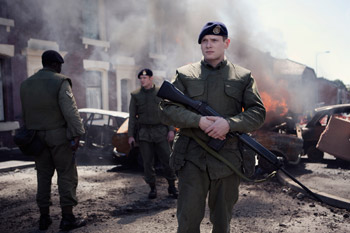
Jack O'Connell '71
Cast: Jack O'Connell, Sam Reid, Sean Harris
Director: Yann Demange
Genre: Action, Drama, Thriller
Rated: MA
Running Time: 99 minutes
Synopsis: England, 1971. New recruit Private Gary Hook (Jack O'Connell) expects to be stationed in Germany. His superiors have other plans. 'Because of the deteriorating security situation in Belfast", his platoon is coldly informed, 'your regiment is now being deployed there on an emergency basis." Before he's stationed to Northern Ireland, Hook breaks the news to his 10-year-old brother, Darren (Harry Verity). He has a farewell kick around and returns Darren to the Children's Home where they have both been brought up, promising he'll be 'back soon."
Hook and his platoon are marched into their Belfast barracks by their Corporal (Babou Ceesay). The platoon's makeshift dorm in an abandoned school is bleak and dilapidated. 'Don't worry", the Corporal reassures them, 'you'll only be staying here -til one of the paddies shoot you." Lieutenant Armitage (Sam Reid) introduces himself to the platoon of which he is newly in charge. Hook and the other men sense the officers' inexperience and are amused by his awkward manner. Later that night, unable to sleep, Hook gets some air. Three men in civvies walk past. 'MRF – undercover guys", warns the corporal, 'nothing to do with us."
A group of junior officers, including Armitage, are briefed about the Belfast situation by their Commanding Officer (Sam Hazeldine). The city is divided between Protestant Loyalist areas ('friendly") and the Catholic Nationalist areas ('hostile"), both with paramilitary factions. To complicate matters, the Nationalist movement is at war with its own: the 'official" IRA (Irish Republican Army) against the younger, radical street-gangs – the 'Provisional" IRA. The officers are warned not to enter a particularly dangerous housing estate which is a Republican stronghold, the Divis Flats. The platoon's first assignment is to assist the RUC (the Royal Ulster Constabulary) in a house search in the Catholic Community. Armitage vetoes the use of riot gear and the platoon leave in their truck, without helmets or shields.
Armitage's men arrive at their RV point. Nationalist kids greet them with a barrage of urinefilled balloons and parcels of excrement. The platoon laugh it off. Led by an armoured Humber Pig, the RUC arrive and the convoy continues to a terraced Catholic street. There are signs of fortification, streets and alleys blocked by burnt out, and burning vehicles. There are obvious signs of previous trouble and the street resembles a war zone. Women bash dustbin lids on the pavement to signal the army's arrival. The soldiers dismount and cordon off the target house, which the RUC quickly enter. A crowd gathers on the street. A suspect escapes the raid house and is beaten in the street by the RUC. The crowd are incensed and as the suspect is bundled into the Humber, the angry crowd break through the army line. A warning shot is fired. The mob respond with rocks and a soldier is hit. In the chaos, a boy steals an army rifle and vanishes into the crowd. Hook and his comrade Thommo (Jack Lowden) are ordered to retrieve the gun. When they catch the boy, they realise they are marooned further down the street away from the main unit and in the midst of the mob. They are attacked and quickly kicked to the ground, a group of locals led by a woman step in to shield the soldiers from their attackers. Armitage panics and in a state of chaos the other troops are chased from the street by the mob. They fail to see they have left the two men behind. Two young local men, Sean (Barry Keoghan) and Haggerty (Martin McCann) approach the two soldiers as the woman holds off the mob. Haggerty pulls out a gun and Thommo is shot, point-blank, through the head. This in turn spooks the crowd and the gunmen are momentarily unable to execute Hook. The confusion allows Hook to make a desperate run for it. The two gunmen hunt Hook through a maze of rat-runs and back alleys. He takes cover in an outhouse; his face is still spattered with Thommo's blood. Hook finally breaks down.
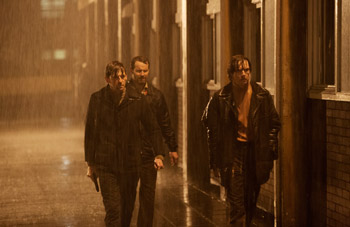 The two gunmen return to the empty Belfast Street where Thommo's body lies. Boyle (David Wilmot), an IRA veteran, confronts Haggerty over his unsanctioned actions while warning the more impressionable Sean not to get involved. As Sean leaves with Boyle, Haggerty jumps in a car with gang leader, Quinn (Killian Scott). They drive off to find 'the Brit".
The two gunmen return to the empty Belfast Street where Thommo's body lies. Boyle (David Wilmot), an IRA veteran, confronts Haggerty over his unsanctioned actions while warning the more impressionable Sean not to get involved. As Sean leaves with Boyle, Haggerty jumps in a car with gang leader, Quinn (Killian Scott). They drive off to find 'the Brit".
At the barracks, the MRF, headed by Officer Browning (Sean Harris), hear about the missing soldier. Unmoved, Browning intends to go ahead with an undercover operation his unit have planned for that night. As Thommo's body is recovered by the regiment, Hook, lost and alone, nervously leaves the outhouse under cover of night. He takes a jumper from a clothes-line to conceal his uniform. Skirting around the fringes of a riot between Catholics and Protestants, Hook dodges the Molotov cocktails and encounters a young boy who is an enthusiastic participant in the action. Hook makes an uneasy alliance with the loyalist boy, Billy (Corey McKinley), who is delighted to meet a real soldier and offers to take him to safety. Hook warily accepts. 'Are you Protestant or Catholic?" Billy asks. Hook shrugs: 'I don't know."
Hook is escorted to a loyalist pub. In a back room, the MRF's Sgt Lewis (Paul Anderson) is handing Loyalists a seized IRA bomb for a retaliation attack. It seems that Hook catches a glimpse of the explosive device Lewis is working on. Lewis meets Hook at the bar, calms him and then leaves to meet Browning in a waiting car. Browning orders him to remove Hook from the pub. When Billy joins Hook at the bar, Hook goes outside to see where Lewis has gone. In the backroom, Loyalists place the bomb in a sports bag – clumsily. As Billy opens a packet of crisps, the bomb accidentally detonates in the pub.
Hook is hurled onto the pavement by the blast. Shaken, he returns to the wreckage, retrieves Billy and passes his body to a Loyalist woman. Hook stumbles away from the blast. As the adrenalin wears off, he collapses, clutching a serious wound to his stomach. Driving away from the blast, Lewis and Browning clash over the explosion. Lewis adds that Hook may have seen the bomb in the backroom. Their covert operation may be compromised. They convince themselves he can't have survived the blast.
Slumped in a terrace street, Hook is rescued by a father and daughter – Eamon (Richard Dormer) and Brigid (Charlie Murphy). He's carried back to their flat in a Catholic estate. The same estate the soldiers were warned not to enter in the briefing. As they remove his jumper to dress his wound, they discover Hook's uniform. Hook screams in agony as Eamon – a former army medic – sews up the wound without anaesthetic.
Aware that Hook's presence endangers their own safety, Eamon contacts Boyle, who visits the flat as Haggerty watches. Boyle tells Eamon he'll take care of Hook. Overhearing from the bedroom, fearing for his life, Hook takes a knife and escapes the flat.
The MRF and a unit led by Armitage leave the barracks to find Hook. The MRF meet with Boyle in a car, where a deal is struck: in return for the missing soldier, the MRF will kill Quinn. Hook sees Quinn's car arrive at the estate and his obvious escape route is blocked. He staggers along the walkways of the estate trying to avoid the gang and find another way out. When Quinn arrives at the flat expecting to find and kill Boyle, Brigid reveals to Quinn that a soldier had been hiding in the flat. They believe he is still in the estate and immediately head off in pursuit. One of the gunmen is left to stand guard while they hunt for Hook. Hook stumbles through the dark corridors of the estate as Quinn's men close in. Hook is forced in to a confrontation with Haggerty and kills him with the knife. He takes Haggerty's gun and escapes, only to be cornered and captured by Quinn and Sean.
With Boyle, the MRF enter the flat, shooting Quinn's guard. Holding a gun to Eamon's head, Browning demands to know Hook's location. Boyle interrupts and says he knows where Quinn is likely to have taken Hook.
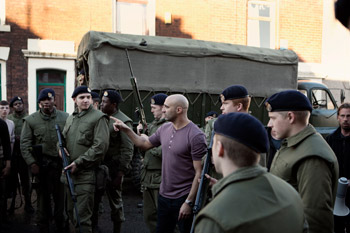 In the cellar of a disused pub on the estate, Hook is forced to his knees ready to be executed. Quinn urges Sean to pull the trigger, to prove himself. Sean hesitates. The MRF arrive and Quinn goes to investigate. A gunfight crackles through the bar. Hook and Sean are left alone in the cellar. As Sean is about to show mercy and lower his gun, Lewis enters and shoots him. Lewis embraces Hook then begins to choke him determined to silence this witness to his unit's collusion with the loyalists. Hook fights for his life. Armitage creeps in to the room. He can't believe his eyes as he sees Lewis attempting to kill Hook. Before he can intervene, Sean, wounded, rises and shoots Lewis. Hook and Sean exchange glances, but Armitage instinctively shoots Sean and kills him before Hook has a chance to stop him. Outside, in the rain, Officer Browning finds Quinn and forces him to his knees with a gun to his head. He tells him about Boyle's bargain to have him killed. He tells Quinn that they 'can work together" and that Boyle 'should be dealt with" then lets him go. They'll be seeing each other again. In the aftermath, a shell-shocked Hook watches from a troop carrier as bodies are collected from the estate.
In the cellar of a disused pub on the estate, Hook is forced to his knees ready to be executed. Quinn urges Sean to pull the trigger, to prove himself. Sean hesitates. The MRF arrive and Quinn goes to investigate. A gunfight crackles through the bar. Hook and Sean are left alone in the cellar. As Sean is about to show mercy and lower his gun, Lewis enters and shoots him. Lewis embraces Hook then begins to choke him determined to silence this witness to his unit's collusion with the loyalists. Hook fights for his life. Armitage creeps in to the room. He can't believe his eyes as he sees Lewis attempting to kill Hook. Before he can intervene, Sean, wounded, rises and shoots Lewis. Hook and Sean exchange glances, but Armitage instinctively shoots Sean and kills him before Hook has a chance to stop him. Outside, in the rain, Officer Browning finds Quinn and forces him to his knees with a gun to his head. He tells him about Boyle's bargain to have him killed. He tells Quinn that they 'can work together" and that Boyle 'should be dealt with" then lets him go. They'll be seeing each other again. In the aftermath, a shell-shocked Hook watches from a troop carrier as bodies are collected from the estate.At a military de-briefing, Armitage explains to the Commanding Officer that he saw Lewis trying to kill Hook. Browning counters that it was 'a confused situation". The C.O backs up Browning's version and Armitage is silenced. The truth will be covered up. Hook is marched in, told he's lucky to be alive and should thank the MRF for rescuing him. 'We look after our own in the army", the C.O adds, Hook is dismissed.
A ship sails back across the Irish Sea. Hook stands at the rail, alone. He looks at his dog tags in his hand. He throws them in to the sea. Back home Hook is reunited with Darren. The pair leave on a coach, it drives into the distance in the low winter sun.
'71
Release Date: March 19th, 2015
About the Production
After completing the critically acclaimed and multi award winning Channel 4 series -Top Boy', director Yann Demange was ready to embark on his debut feature film. Despite developing and reading numerous scripts he had not found his next project. One screenplay he did not anticipate connecting with was a thriller set in Northern Ireland during the early years of the Troubles. However, after reading the script, he was gripped by the story of '71, it struck a chord and the main character resonated with Yann Demange.
The project was conceived a few years earlier as an original idea by producer Angus Lamont of Crab Apple Films. 'I had a friend at school who joined the army at 15", he said. 'He'd already been to Cyprus and Northern Ireland while we were still doing our exams, he was so young to be in those situations. I'd also been researching The Troubles, and had come across a piece from the perspective of a Loyalist gang member. He talked about seeing a teenage British soldier crouched in a doorway, terrified, confused and crying in the middle of a sectarian riot. This young soldier, like most of the public on mainland UK, had no concept whatsoever of what was happening in Northern Ireland. I thought there was a story in his experience in that environment."
It was this human experience that also attracted Yann Demange. He immediately connected with the powerful narrative of the young man, which seemed universal and relevant in the modern world. This was a timeless story which would continue to appeal and captivate. 'I'd never had a burning desire to tell a story about Northern Ireland in that period" says Yann Demange. 'But it was a remarkable piece of writing. It was muscular, visceral and utterly engaging. Above all, the idea of young men sent to fight dirty wars also struck me as pertinent. Often, they have more in common with the kids they're pitted against than the men they're taking orders from. It could be Iraq or Afghanistan. In '71's protagonist, Gary, I saw the opportunity to explore the vulnerable masculinity of an anchorless boy, with no family, looking for a tribe to belong to and ultimately finding it in the army, only to be betrayed…"
To move the script forward, Angus Lamont had joined forces with Robin Gutch of Warp Films and they both had the same writer in mind - playwright Gregory Burke - who had crafted his multi-award winning play -Black Watch' from interviews conducted with Iraq war veterans. 'I really wanted someone who could capture the voice of young squaddies", says Angus Lamont, 'Gregory Burke immediately got it. The screenplay was commissioned with finance from Creative Scotland, Northern Ireland Screen, and Warp Films (using BFI Vision Award funding). Gregory Burke's powerful first draft soon gained the attention of Film4, the BFI and Studiocanal. It was at this point that we asked Yann to read it."
'When we met Yann", Robin Gutch says, 'he pitched almost exactly the same film we'd imagined." 'It can happen like that", remembers Yann Demange. 'Sometimes you immediately know exactly how it will look and sound. Then when I met the writer Gregory Burke, he and I just clicked and after three months he'd rattled through five drafts."
When it came to casting his lead, the candidates to play Private Gary Hook came down to a short-list of one: Jack O'Connell. 'We sent him the script, and he came in to read and just blew us away. It was obvious we'd found our man. Jack O'Connell has an unusual quality that you don't see in many young actors of his generation", says Yann Demange. 'He's got an old-school quality, a raw vivid masculinity that he's quite at ease with. He has a soulfulness and complexity within him that was right for the role. He could genuinely empathise and understand Gary Hook."
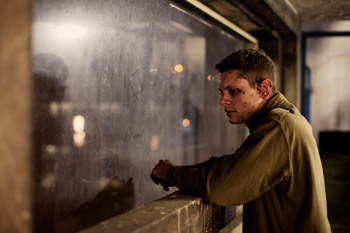 'What I love about Greg Burke's script", says Jack O'Connell, 'is there are no answers, no attempt to shift the blame. I'm half-Irish myself, and could see that these events were realities to people. I wanted to normalise Gary Hook as much as possible, make him someone who existed in that time."
'What I love about Greg Burke's script", says Jack O'Connell, 'is there are no answers, no attempt to shift the blame. I'm half-Irish myself, and could see that these events were realities to people. I wanted to normalise Gary Hook as much as possible, make him someone who existed in that time." Filmed in the UK over nine weeks, seven of which were night shoots, '71's production was as arduous as it was invigorating. 'It was a tough shoot, man", laughs Jack O'Connell, 'but we knew it was going to be brutal. I was on set only a little less than Yann, so a good relationship between us was key, I trusted him totally." Together, Yann Demange and Jack O'Connell cut back dialogue on set to craft a sparser characterisation. 'It's a very expressive performance", says Yann Demange, 'Jack O'Connell's pretty alpha, he's got real fight in him, so he found it quite taxing holding back. It's an exhausting part to play - you can't hide behind the lines. I think he's brave and committed and incredible to watch." The challenge, for Jack O'Connell, wasn't just the physical endurance – it was getting under the skin of the era. 'To me, '71 is truly a period film", he says. 'I couldn't modernise Gary Hook in any way. I hope I was immersed enough to kill any of my own contemporary mannerisms and do the character justice."
Although the production benefitted from Northern Ireland Screen's backing from the outset, filming took place on location in England. 'The Belfast of 1971 doesn't exist in Belfast today", Angus Lamont explains. 'To make it look as authentic as possible it had to be fake."
Blackburn and Liverpool were cast as an uncanny double to Belfast's terraces (it's all in the red bricks), while Sheffield's Park Hill Estate served as a brutalist doppelganger to the notorious Divis Estate. 'Fundamentally, '71 is a thriller", notes Robin Gutch, 'but Yann Demange wanted to create a sense of credible action, and for that we needed credible locations. Throughout, exmilitary were posted on set to advise cast and crew". 'From the way to hold a specific rifle to the squaddie lingo", adds Jack O'Connell, who found himself drawing on his previous workexperience in the army. 'At one point I was determined to join it after my football career messed up", he said.
It was Blackburn where the film's alarming and explosive riot was staged, the turning point of the film. 'It was extremely intense", says Yann Demange. 'We filmed over five days, rehearsed the whole sequence, and then ran it in real time, over and over again. Making sure the energy levels stayed up. The supporting actors were unbelievable and they really helped to make that scene come alive. One of the older gents got so into it that he was collecting the rocks – all rubber – and pocketing them to throw at the army."
'We'd already shot the boot camp and training sequences", continues Jack O'Connell, 'so me and the boys felt like a unit by the time we were shooting the riot. That part of it I loved – I've made some great friends on the film – but over those five days there was a heat wave, we were all in -70s costume and everything was made of wool. Respect to Yann Demange for his focus during those scenes - we spent a lot of effort ensuring the riot felt volatile and risky."
With his regular cinematographer Tat Radcliffe, Yann Demange opted to shoot on 16mm for '71's daytime sequences, switching to digital for its night scenes. 'We also shot anamorphic to give a more epic feel to the landscape." Demange also created a Tone Book, which he invited the HOD's (Heads of Department) to contribute to. The result was a reference book heaving with visuals from the period, it also included photographic references, music and film clips. Ranging from Jean-Pierre Melville's Le Samurai to the work of Walter Hill and John Carpenter.
Speaking about the aesthetics of the film, Yann Demange says, 'When I started researching the period, the visuals immediately struck me strongly as apocalyptic with road-blocks, burnt-out cars, smoke, dystopic, disturbing landscapes. Although the film is set in a recognisable urban environment of terraced houses and estates, for me, Gary Hook's journey is one that becomes more mythical and desperate as night draws in. I didn't want us to be tied to realism the whole time. I imagined the post bombing scene, for instance, to look like a purgatory, a transient unsettling place between life and death."
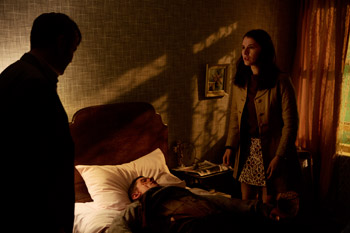 Gary Hook's experience, and his oppressive environment, is echoed in the sound of '71. 'I didn't want a classic score that underlined the emotional highs and lows", Yann Demange says. 'I wanted something sparse to match Jack O'Connell's performance, almost Carpenter-esque, a soundscape." The Belfast-born music composer David Holmes, renowned for his funk-fusion scores for Steven Soderbergh, recalls his earlier, ambient work for '71. 'I'd worked on a project with David before", says Yann Demange. 'When he heard I was doing a movie set in Belfast, he read the script and told me, -When I was four years old, I was sitting in the bath tub and my house was bombed. I've got to do this movie.' I don't even think he was ever offered the job. It just happened." Unusually, Yann Demange asked David Holmes to compose the music before '71 even started shooting. 'He'd never done that before", says Yann Demange, 'but it worked great for me, especially filming at the Park View estate for '71's third act. I'd direct a sequence, with David Holme's music on my headphones, and immediately feel a tone for the scene."
Gary Hook's experience, and his oppressive environment, is echoed in the sound of '71. 'I didn't want a classic score that underlined the emotional highs and lows", Yann Demange says. 'I wanted something sparse to match Jack O'Connell's performance, almost Carpenter-esque, a soundscape." The Belfast-born music composer David Holmes, renowned for his funk-fusion scores for Steven Soderbergh, recalls his earlier, ambient work for '71. 'I'd worked on a project with David before", says Yann Demange. 'When he heard I was doing a movie set in Belfast, he read the script and told me, -When I was four years old, I was sitting in the bath tub and my house was bombed. I've got to do this movie.' I don't even think he was ever offered the job. It just happened." Unusually, Yann Demange asked David Holmes to compose the music before '71 even started shooting. 'He'd never done that before", says Yann Demange, 'but it worked great for me, especially filming at the Park View estate for '71's third act. I'd direct a sequence, with David Holme's music on my headphones, and immediately feel a tone for the scene." The result is a desperate, urgent manhunt thriller set in a fierce, fluid period in British history rarely represented on screen. 'Most of the films about the Troubles are relatively modern", says Angus Lamont. 'But in contemporary footage from 1971, Belfast and its people look like they were from a previous era, a distinct look, more -50's than -70's, that was mirrored even in the British Army uniforms. It was 1972 that saw a spike in violence, close to 500 murders, but if you want to know why that happened, you have to look at the period before it." The film captures that turbulent era, when the IRA, Loyalists, police and military were all trying to figure their way around the situation they found themselves stuck in. That chaos seems unknown today, forgotten. So it's appropriate that the central character has the same perspective as most of the audience. Dropped in the middle of it and trying to understand which side is which. Angus Lamont says, 'Through his eyes we're hoping to provide insight into what was a dark, dark time." Jack O'Connell follows, 'From the reaction we've had, from people who lived through the Troubles, it feels like the film is an honest portrayal. There's no incrimination – it's the story of a war, and in war, the rules get bent." He pauses and smiles, 'it should make for a boss film."
'71
Release Date: March 19th, 2015
MORE
- Mission: Impossible Fallout
- Glenn Close The Wife
- Allison Chhorn Stanley's Mouth Interview
- Benicio Del Toro Sicario: Day of the Soldado
- Dame Judi Dench Tea With The Dames
- Sandra Bullock Ocean's 8
- Chris Pratt Jurassic World: Fallen Kingdom
- Claudia Sangiorgi Dalimore and Michelle Grace...
- Rachel McAdams Disobedience Interview
- Sebastián Lelio and Alessandro Nivola...
- Perri Cummings Trench Interview



